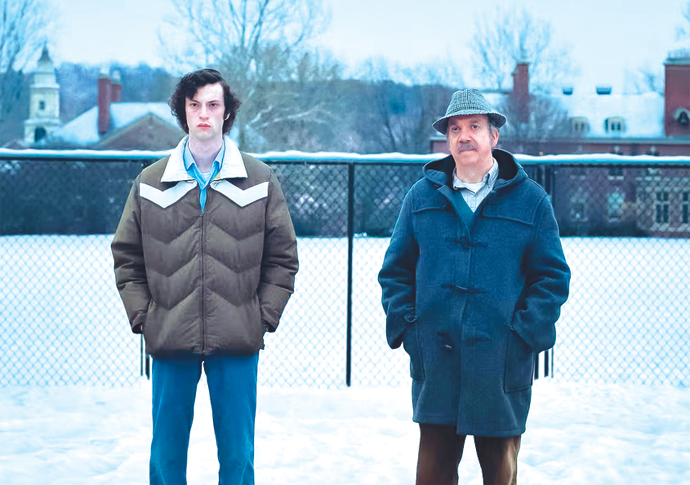Classrooms at Christmas in The Holdovers
Story set in a posh New England boarding school is dramatic, meaningful, and offers a philosophical take on the human condition
Thursday, 18th January — By Dan Carrier

Dominic Sessa and Paul Giamatti in The Holdovers [Seacia Pavao/AP]
THE HOLDOVERS
Directed by Alexander Payne
Certificate: 12a
☆☆☆☆☆
THE Roman philosopher/emperor Marcus Aurealius wrote in his Meditations: “Accept the things to which fate binds you, and love the people with whom fate brings you together, but do so with all your heart.”
For classics teacher Paul Hunman, the works of the 2,000-year-old Stoic are a building block for his attempts to create solid citizens from pupils he sneers at for their born privileges.
But Aurealius – who figures like a ghostly guiding presence – provides thoughts on friendship and relations that offer a reflection of Paul’s journey.
For Paul (Paul Giamatti), a case of more practice and less preaching is clearly in order.
At a posh New England boarding school, Paul runs a tight ship, trying to get as much classical thought into pupils’ brains as he can so he doesn’t have to see them next year.
We learn he was once a “Barton Boy” too – and vile headteacher (Andrew Garman) was one of his pupils, making for an uncomfortable relationship.
When Hunman gives honest but low grades to the son of a school benefactor, his punishment is to stay over the Christmas holidays and babysit pupils who have nowhere to go.
For the boys, it looks like a particularly unpalatable way to spend the festive period.
Head cook Mary (Da’Vine Joy Randolph), who has lost her son in Vietnam, will be joining them.
Angus (Dominic Sessa) finds himself the sole remaining pupil, while we learn Mary’s son was a Barton Boy. Unlike his peers, he was drafted – and racism and privilege is why. This is an unavoidable fact for Mary and Dr Hunman to face.
How will the three find common ground, what will bring about the thaw in their relationships? Payne handles this masterfully.
The characters’ behaviours are peeled away, little by little. Each scene creates a new level of understanding of each.
For a story that is dramatic, meaningful and will offer you a philosophical take on the human condition, The Holdovers is very funny. It looks great.
Payne has not felt the need to scream at his audience This Is The 1970s. Instead of packing it with costume shop outfits, he has used a nostalgic colour palette. The 1960s sequins have lost their sparkle. Vietnam brings death. Payne lays out his stage to show that.
How can one so wise be so bad at living?
It is a question Payne asks – and seeks to answer – with wit and insight.